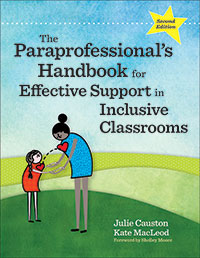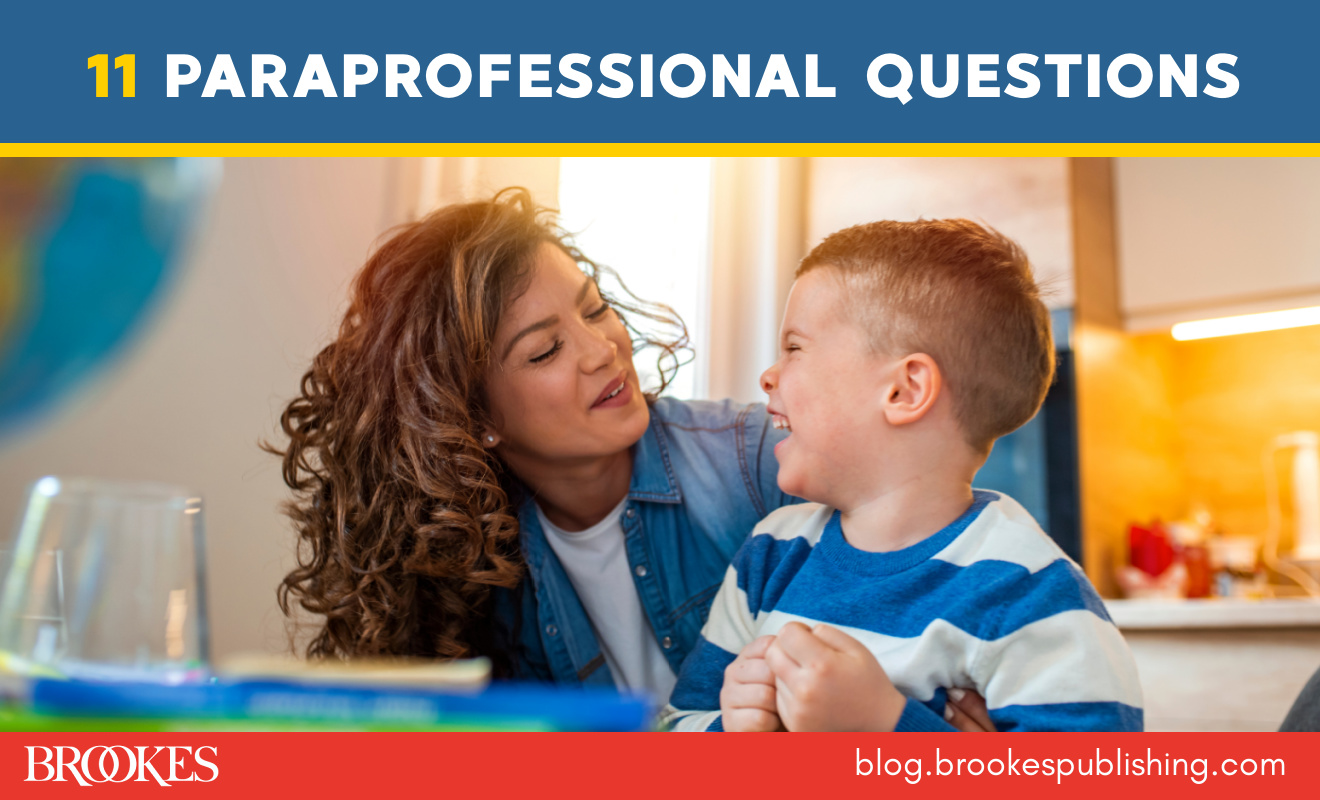 Paraprofessionals are key members of every successful inclusion team. Today’s post provides concise, helpful answers to some of the most commonly asked questions paraprofessionals have about their important job. Excerpted and adapted from the second edition of The Paraprofessional’s Handbook for Effective Support in Inclusive Classrooms, by inclusion experts Julie Causton and Kate MacLeod, this is great information to share with paraprofessionals and the educators they work with.
Paraprofessionals are key members of every successful inclusion team. Today’s post provides concise, helpful answers to some of the most commonly asked questions paraprofessionals have about their important job. Excerpted and adapted from the second edition of The Paraprofessional’s Handbook for Effective Support in Inclusive Classrooms, by inclusion experts Julie Causton and Kate MacLeod, this is great information to share with paraprofessionals and the educators they work with.
I’m being asked to provide extensive support and have been told never to leave the student’s side. I know this is embarrassing to the student. What should I do?
You have to provide the type of support that the team deems appropriate. However, if you think it is not helpful to the student, work with your team and discuss when it might be appropriate to fade your support. Ask questions such as, “What would fading look like for this student?” or “What other types of support can be in place to allow for student success?”
One student asks me to “go away” when I work with him. I cannot just let him sit there and fail. What should I do?
Listen to the student. If a student requests that you not work with them, do not support the student at that time. Instead, figure out how you might provide support without being physically next to the student.
When a direction is given, a student just calls my name and asks me to come and help. I am trying to fade my support, but the student will not do anything without me by her side. What should I do?
This student has become very dependent on adult support. We would sug¬gest talking to the student about the need to try things by herself or asking peers for help. Encourage all students in the class to use and provide help to one another. Also be sure to involve your team in determining ways to increase the student’s independence. You want the solutions to make the student feel empowered to become more independent—not punished for their dependence. Consider having different student roles at the table groups. One person can be responsible for fielding any questions the table¬mates may have.
I understand why I should fade my support, but I worry that people will think I am not doing my job. What can I do while I am fading my support?
This is a common concern. When moving away from a student, you can support other students, prepare for an upcoming class by creating modifi¬cations, take data on social interactions or behavior, read the student’s IEP, help the teacher prepare for an upcoming task, or search the school library and Internet for pictures and videos to support learning. You also can ask your team to brainstorm a list of ideas that fit your particular situation. The best practice is to be open and communicate frequently with your col¬leagues so that everyone is on the same page about fading support.
What if my student needs intrusive supports due to physical disabili¬ties?
This will certainly be the case for some students. However, we encourage you to use the data tracking and planning tools with your team to discover a variety of ways to use peers and invisible and material supports when¬ever possible. For some students, independence won’t be the goal—interde¬pendence with peers will be.
Am I allowed to lead a small-group discussion?
Yes, you can lead a small-group discussion or review material with students under the direction of a certified teacher. You are not typically allowed to introduce new material, but you can reinforce material taught previously by a certified teacher.
Can I teach an entire class by myself?
A paraprofessional generally does not teach an entire class new material, but you could be responsible for reading a book aloud to the class or sup¬porting the work of the entire class under the direction and supervision of a certified teacher.
I’m really struggling to understand the content of the class. What should I do?
First, work with the classroom teacher or your case manager to better understand the content. Try to stay a step ahead of the students. Take things home and study them or learn them. You don’t nec¬essarily need to be an expert in the content, but having some foundational knowledge helps. Your role as the paraprofessional is to provide support in helping the student access the curriculum content, not teach¬ing it; the student can access the general education teacher when they get stuck on content-specific concepts or ideas.
I do not feel that I’ve been trained enough to do my job. How can I get train¬ing?
The simple answer is, you should ask. Start with your building principal or the head of special education in your school. The following elements could be included in an email, phone call, or letter to your supervisors:
- Be specific about the type of training you need. For example, you could say, “In my current position, I need to know more about working with students on the autism spectrum.”
- Ask whether they know of any training that is being offered, or ask whether they could hire someone to come in to work with the school or team.
Who is ultimately responsible for the education of the student I am supporting?
The special education teacher and general education teacher assigned to the student are responsible. The term case manager or service coordinator is sometimes used to refer to the special education teacher assigned to the student.
I am just left to figure out how to support my students. What should I do if I receive almost no direction from a teacher?
This is unfortunately a common and major problem. You should first set aside time with the teacher who is directing your work. Be prepared with a list of questions. Ask for the support you need to do your job. Here are some questions to get you started:
- Could I have a written plan to follow throughout my day?
- Could you please tell me specifically what to do when the student gets anxious, gets out of their desk, or [fill in a concerning behavior here]?
- When I support the students in math, could you give me an outline tell¬ing me what to do?
- Can I shadow you for a day to get a better sense of what I am expected to do?
Need a real-world guide to mastering what a great paraprofessional should know and do? Get more practical guidance in the book behind today’s blog post!

The Paraprofessional’s Handbook for Effective Support in Inclusive Classrooms, Second Edition
By Julie Causton, Ph.D., & Kate MacLeod, Ph.D.
“Best PD book I have read in years. Practical and fun, it provides support and dignity to the person on the education team who has been undervalued for decades—the paraprofessional.”—Shelly Habegger, Director of Curriculum & Instruction, Barberton City School District, Ohio
Stay up to date on the latest posts, news, strategies, and more!
Sign up for one of our FREE newslettersMore posts like this

12 Ways Paraprofessionals Can Teach Independence Skills
December 8, 2020
15 Indicators of Authentic Membership in an Inclusive Classroom
May 16, 2024


Write a Comment
Your email address will not be published. Required fields are marked *
Post a Comment